V <<< Author: W >>> Y
Jump to:
Diane Wald |
David G. Walker |
William Walsh |
Eric Wasserman |
Anthony Russell White |
J. Edwin Whitelaw |
Ian Randall Wilson |
Francine Witte |
Gregory J. Wolos |
Anne Harding Woodworth |
Grzegorz Wroblewski
Diane Wald
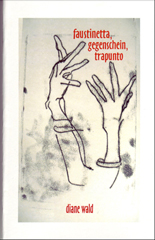 faustinetta, gegenschein, trapunto by Diane Wald
faustinetta, gegenschein, trapunto by Diane Wald
Červená Barva Press, 2008-
These three poems somehow asked to be together. They are full of alive and dead people, full of genuine and created personalities, full of composite desires and fears and mockeries. They popped up out of the love of words, and the word-secrets we all hold dear. The title words brought me buckets of pleasure, and I wanted to celebrate and embellish them. One of them I made up, one of them I learned, one of them I'd forgotten I knew. I think all three are united in mystery, begging for me to believe them.
$7.00 | 20 Pages | In Stock: 25
-Diane Wald
David G. Walker
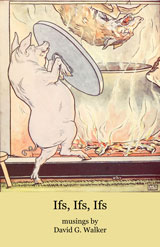 Ifs, Ifs, Ifs musings by David G. Walker
Ifs, Ifs, Ifs musings by David G. Walker
Červená Barva Press, 2021-
David G. Walker's first poems were published in 2014: just after the ink was drying on his MFA from Southern Connecticut State University. Since that time, he has published work sporadically with high points and dry spells abounding. His previous two chapbooks - Pause: A Collection of Moment Poems and Donating Organs in Boxes - were published by Finishing Line Press. In 2016, his poem "California" won the Steel Pen Conference Creative Writing Contest and his poem "Cathedral" was nominated for Best New Poets in 2018. Currently, he lives in Massachusetts with his wonderful wife, Caitlin; his two children, Mikey and Ellie; and his cat, Eva.
Those throw-away nuggets of thought you have at 3am were the seeds of the poems found within Ifs, Ifs, Ifs by David G. Walker. The manuscript is a mad dash through fairy tales, car accidents, and form rejection letters - with a pit stop at a cult-leading leaf. Imagination pulses through the poetry in this collection as Walker attempts to explore the elusive ifs we all shove in the dark corners of our brains. What emerges is anyone's guess.
David Walker tells us at the start, "I reach higher and lower states," and thankfully, that reflexivity applies to his comedy, as well as to his states of consciousness. From a highbrow conversation with Emerson to a lowbrow satirical rejection letter, or a poem about a suicidal Santa, Walker tears through decorum and expectations to make us cringe, and laugh. The pathos exorcised in this short collection get right up close to the pain. A carpenter puts a nail through his thumb and keeps hammering, and the taxidermist whistles while he works. In between we're treated to beautiful rhymes and imagery like "I mark me up in a soft pink highlighter, barely noticeable, my time in running cars. / I flip me and draw a dash through flower-shop doorbells, / Through Crunch bars, fun-size." And fun it is, indeed!
-Michael FilasImagine you're eating a bowl of cereal and skimming the morning headlines when you feel a sudden urge to slip outside of yourself and ask, "What if?" In David Walker's most recent poetry collection we're invited to navigate mundane life as Emerson's transparent eyeball--absorbing what surrounds us as well as what sits quietly (and not so quietly) below the surface. Our questions have the potential to be life-altering (what if we passed the deer on the roadside minutes before the accident?) and wildly speculative (maybe we'd have all the answers if we'd finished reading Paradise Lost in college). And in our brief time as ultra-meta-floating-eyeball, we become increasingly self-aware and foresightful ("I feel the water in my body tugging towards the faucets") as Walker takes on the guise of an all-knowing editor who insists that we "stop trying to romanticize the 'moonlight'" and record what we see, as we see it. Dear Writer, you "soulless thing," you, "it's either/or, there is no middle ground."
-Meg CowenIfs, Ifs, Ifs takes wing into the hypothetical realms of the Out-of-the-Ordinary, the Double-Take-Head-Spin, and Irreverence-R-Us. The poems in this collection float and sink at the same time. They bob and weave and come straight at you slantwise. Even as they take on some of life's thornier existential concerns, they are a pleasure, joyously serious and seriously joyful.
$8.00 | ISBN: 978-1-950063-49-9 | 32 Pages
-Jeff Mock
William Walsh
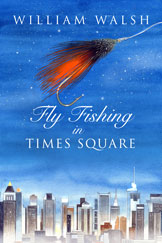 Fly Fishing in Times Square by William Walsh
Fly Fishing in Times Square by William Walsh
Červená Barva Press, 2020William Walsh is the author of four books of poetry, four novels, three film screenplays, a collection of interviews, an anthology of contemporary American poetry, and a collection of essays. He is the director of the Etowah Valley M.F.A. Program at Reinhardt University in Waleska, GA where he teaches graduate and undergraduate creative writing and literature. Among his awards for his writing, he has received the 2018 Cervena Barva Press Editors Book Series Award, Georgia Author of the Year, and has been recognized by the Association of American University Presses as a Selection for Public and Secondary Libraries. He has been a finalist or semi-finalist in many competitions, including, among others, the Glimmer Train Short Story Contest and the William Faulkner "William Wisdom Creative Writing Competition" for his novels The Boomerang Mattress, Haircuts for the Dead, and The Pig Rider. His work has appeared in AWP Chronicle, Cimarron Review, Five Points, Flannery O'Connor Review, The Georgia Review, James Dickey Review, The Kenyon Review, Literary Matters, Michigan Quarterly Review, North American Review, Poetry Daily, Poets & Writers, Rattle, Shenandoah, Slant, and Valparaiso Poetry Review. Known for his literary interviews, he has interviewed some of the most highly respected writers in the world, including A.R. Ammons, Doris Betts, Richard Blanco, David Bottoms, Joseph Brodsky, Pat Conroy, Harry Crews, James Dickey, Ariel Dorfman, Mark Doty, Rita Dove, Stephen Dunn, Eamon Grennan, Mary Hood, Edward Jones, Madison Jones, Donald Justice, Ursula Le Guin, Andrew Lytle, Czeslaw Milosz, George Singleton, Lee Smith, and many others. Originally from Jamestown, NY, he has resided in Atlanta since 1980.
"Memory, nostalgia, a changing America. The magic of the animal world and the fragility of all creatures. An eschewing of what is manmade and crowded and impersonal. Comradeship, sports, and competition. Beautiful unfulfilled mothers, the difficult communication of fathers and sons. William Walsh's Fly Fishing In Times Square is a love letter to Americana, a love letter to America. Each of these exacting, spectacular poems come around the corner like long lost friends to kiss each reader on the cheek."
—Denise Duhamel"William Walsh is a master of the narrative poem. In Fly Fishing in Times Square, he investigates memory, the self, family, and being with sculpted imaginal and aurally textured confidence. His poems elucidate rather than purposefully befuddle; they refresh rather than freight; they revivify rather than siphon a reader's emotional energy. However, Walsh is not afraid to step into the dark and witness existential matters—but it’s in this lack of hesitation to do so-as well as his ability to explore a wide gamut of both macroscopic and microscopic motifs-that makes his poems so beautiful. They are manifestations of "what happens / when imagination confronts the universe." Fly Fishing in Times Square is a book I'll read more than once; it's the sort of collection that teems with ideas and leads others to their own inspirations."
—William Wright"William Walsh's new poems prove, once again, that 'there's no controlling the world's divine mysteries. With amazing vision and linguistic skill Walsh explores the desires and realities of domestic life in America. Reading these fine poems we are drawn into a complex world of family where separation is natural and memory provides the only means of holding on. These powerful poems never fail to lead us to ask the right questions about family and the wilderness, the world and our place in it."
-David Bottoms"With a keen and painterly eye, Bill Walsh masterfully renders the poetic, mysterious landscapes of memory and place, capturing his spiritual and physical self amid his intangible and tangible worlds that embrace us and become ours. I feel completely at home in these poems that question the very idea of home through imagery and language that is wise with longing, powerfully tender, and passionately at peace."
-Richard Blanco, Presidential Inaugural PoetReviews:
$17.00 | ISBN: 978-1-950063-14-7 | 78 Pages
http://dougholder.blogspot.com/2020/06/fly-fishing-in-times-square-by-william.html
Eric Wasserman
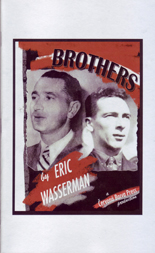 Brothers by Eric Wasserman
Brothers by Eric Wasserman
Červená Barva Press, 2008-
Advance Praise for Brothers:
Take Faulkner's dicturn that "the past is never dead, it's not even past" and transpose it to late Forties L.A. In the grand tradition of John Gregory Dunne's True Confessions, Wasserman's taut little tale finds a mismatched pair of brothers clashing. explosively, at the dawn of the Blacklist era.
-Wesley Strick, screenwriter and author of Out There in the DarkEric Wasserman is the author of a collection of short fiction, The Temporary Life. His short story, "He's No Sandy Koufax," won first prize in the 13th Annual David Dornstein Creative Writing Contest. Brothers is the first chapter from his recently completed first novel, Celluloid Strangers. Eric is an Assistant Professor of English at the University of Akron, wher he also teaches in the Northeast Ohio Master of Fine Arts Program (NEOMFA).
Visit him at www.ericwasserman.com
$7.00 | 19 Pages | No Longer Available
Anthony Russell White
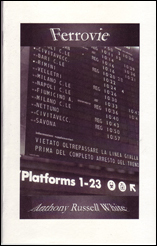 Ferrovie by Anthony Russell White
Ferrovie by Anthony Russell White
Červená Barva Press, 2007-
The 2006 Červená Barva Press Chapbook Poetry Prize Winner
Ferrovie is Italian for trains, and seemed appropriate for a series of poems about strange encounters on Italian trains. I was introduced to the prose poem in 1993 by Robert Bly at a workshop afloat in Alaska, and have been writing them ever since. Some poems just seem to want to be in that form. Some of these ten came from my dreams, a few from actual events, the remainder from pure unleashed imagination.
$5.00 | 20 Pages | In Stock: 15
Anthony Russell White
J. Edwin Whitelaw
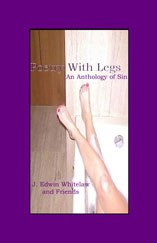 Poetry With Legs An anthology of Sin
Poetry With Legs An anthology of Sin
by J. Edwin Whitelaw and Friends
Červená Barva Press, 2014-
These pages that connect fourteen poets whose chance encounters with one who is no longer with us make fifteen. J. Edwin Whitelaw, obscure to all but those who knew him, provided a connection between those whose works and comments appear within, and to whom this anthology is dedicated.
Born in the Arkansas Delta near Helena in 1953 Whitelaw escaped, however the South’s influence upon him for good and bad played an important role in all aspects of his life until his death on Christmas Eve in 2006. Near his death, he described himself as “a slightly older man” who had become a mere caricature of his former self.
His poetry ran the spectrum from bitingly cruel as you will find in “An Acute Friendship” to the painfully romantic “Icarus Dreams Of Aphrodite” that appear in this collection. And so say his ex-wives and lovers. Once asked for an explanation of his paradoxical approach to poetry, he would not give one.
After leaving the South he began working as an analyst for the Security Service, a branch of the National Security Agency during the early 70’s in San Vito, Italy. “Cooling his heels from the Vietnam Era”, as he put it, he developed a distrust of all things governmental. He later entered teaching on both the preparatory and college level. He held a doctorate from the University of Arkansas, and viewed his colleagues as “boors and pompous asses.”
During the Bush Eras, he found an increasing and alarming distrust of Americans abroad. “This unholy alliance between the Patriots of the Religious Right and the Republican Party will push this country to the fascist brink. But hey, look on the bright side, oppression has always been good for poetry.” according to J. Edwin.
He retired from teaching in the late 90’s. Having lived in three foreign countries, he was conversant in five languages, and later worked as an independent consultant to international firms seeking to do business in the United States.
Divorced more times than he cared to discuss in detail, he once said he was destined to die alone surrounded by his books unless his large dog outlived him. It was a statement that proved to be prophetic. His dog in fact did not outlive him, and he was found dead in his rented flat in the Trastevere District of Rome on Christmas Day 2006 having apparently died the evening before quite alone.
In putting this collection together one contact led to another tied with the common thread of poetry. For his enumerable faults, defects and sins all of which he freely confessed, he with a few exceptions managed to salvage his broken relationships converting them into strange forms of friendships that included me.
Another acquaintance, who asked not to be identified commented to me, “J. Edwin had his share of baggage, but I have to say it was the Louis Vitton of emotional baggage. He suffered from potential.” Not a religious man by any measure, he had somewhat of a distorted moral code that had at its core a disdain of hypocrisy. His take? “By and large self-professed born-again Christians have no sense of poetry, reflection or self examination. Show me one, and I will show you someone who gives Jesus a bad name.”
Fittingly in his honor this anthology is subtitled “An Anthology of Sin” and dedicated to an extraordinary ordinary man.
GISELA FALABELA
$16.95 | ISBN: 978-0-9910091-9-0 | 121 Pages | In Stock
Ian Randall Wilson
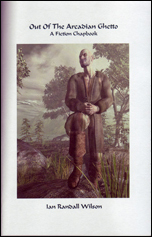 Out Of The Arcadian Ghetto
Out Of The Arcadian Ghetto
A Fiction Chapbook by Ian Randall Wilson
Červená Barva Press, 2007-
Ian Randall Wilson is the author of Hunger and Other Stories (Hollyridge Press, 2000), and the poetry chapbook Theme of the Parabola (Hollyridge Press, 2005). His work has appeared in many journals including the North American Review, the Mid-American Review and The Gettysburg Review. He is an executive at Columbia-TriStar Marketing Group, and on the fiction faculty at the UCLA Extension.
Out of the Arcadian Ghetto is a work of great imagination. It features two previously published stories. In "He Was Known For His Nose," a specialist employed by a reclusive millionaire selects female companionship for his master by the women's smell. When his nose fails, disaster ensues. In "The Three Bears: A Retelling," this classic fairytale is reconceived as a contemporary commentary on race relations between homo sapiens and Ursus arctos.
Small Press Review/ Mar-Apr Picks, 2007
$7.00 | 33 Pages | In Stock: 9
Francine Witte
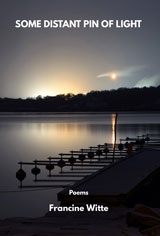 SOME DISTANT PIN OF LIGHT by Francine Witte
SOME DISTANT PIN OF LIGHT by Francine Witte
Červená Barva Press, 2025-
Francine Witte is an award-winning poet, flash fiction writer, and playwright. She is the author of 12 books of poetry and flash fiction and her work has appeared in numerous journals and anthologies. She is a native New Yorker and attends and produces poetry events in the vibrant NYC scene. She is the co-host and co-curator of the online reading, The Prose Garden. She is the flash fiction editor for FLASH BOULEVARD and South Florida Poetry Journal. A former high school English teacher, she now leads writing prompt sessions on zoom. Witte holds an MFA in Creative Writing/Poetry from Vermont College and an MA from SUNY Binghamton. Visit her website at francinewitte.com.
Francine Witte newest poetry collection Some Distant Pin of Light is an exploration of life's fleeting moments, capturing the essence of human emotion with lyrical precision. Her poems delve into themes of love, loss, and the passage of time, blending vivid imagery with evocative language. Each piece is a snapshot of everyday experiences, transformed into profound reflections on the human condition. As with her previous collections, Café Crazy and The Theory of Flesh, these pages are filled with lost lovers, nostalgic family portraits, and her deep concern for the environment. Witte's keen observational skills and masterful use of brevity create a tapestry of interconnected vignettes that resonate deeply with readers.
Gregor Samsa woke up as a huge insect in a bourgeois bed, struggling to make sense of what has happened to him and what he can do about it. Among her many story-telling bursts of brilliance, Francine Witte contemporizes the Kafkaesque shock of being slapped in the existential face, offering up modern perplexities that are familiar as they are strange. A woman finds herself among many middle-aged women in a grocery shop, 'wheeling their girliness around in a shopping carts... (to the) burst of corn pops and leprechauns winking.' A man finds himself trapped in an oceanic human wave, aching to break past his 'beach-locked future' and make connection to the 'distant pin of light' from which he came. There's humor and metaphorical pathos aplenty in this fine collection — from men who can play themselves backwards, to prove that Paul is dead, to a self-declared 'map of me' that would drive you into a lake if you tried to navigate by it. This is smart stuff, New York City smart, memorably smart. Tales told to the tune of the underground thrum which goes beyond the play of good story-telling to a place of reawakening. These are poems to match the beat of a reader's heart — the heart which is 'the acorn inside the tree you have turned into.'
—George Wallace, Walt Whitman BirthplaceThe poems in Some Distant Pin of Light consider how to exist, even thrive, in a world where "the news gets worse/each day." Witte's speakers contemplate the past even as they look forward, look up and consider the sun, the titular "distant pin of light," imagine finally that "billions of miles/away, maybe someone is wishing on it,/wishing for a last desperate chance at love." With her trademark, vivid imagery, Witte captures both the intimate details of everyday life and the cosmic scale of existence, grounding ontological questions in concrete experiences. This is one stellar collection by a writer at the height of her powers.
—Sarah Freligh, author of Sad MathThe book starts out with a Map of Me, "Let’s start by saying this isn’t//A map you'd fold up in a glove box//or pull up on a GPS" guiding the reader into a room of observant wit, which takes center stage... These poems bring the reader wandering through a hushed room of the past: each poem is a relic of art that stands still in time. To observe them in their resting places, a past we cannot change, ends with hope: the last piece, turns our attention to the future in Our Star, where a billion mile lover, which doubles for a wave, "aching to break past his own beach-locked//future, finally able to get whatever he could//wish for on some distant pin of light." This collection of poetry is a true joy to explore.
$18.00 | ISBN: 978-1-950063-90-1 | 71 Pages
—Jennifer Juneau, author of More Than Moon
Gregory J. Wolos
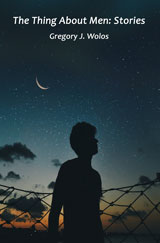 The Thing About Men: Stories by Gregory J. Wolos
The Thing About Men: Stories by Gregory J. Wolos
Červená Barva Press, 2023-
Having raised two children and spent more than three decades as an educator in upstate New York, Gregory Wolos currently resides with his wife of forty-two years in a small town not far from Boston, Massachusetts. Gregory's daily regimen includes writing, running, and tending grandchildren. He holds a doctorate from the University at Albany.
Over one hundred of Gregory's short stories and reviews have been published in journals and anthologies like Glimmer Train, Georgia Review, Michigan Quarterly Review, descant, Florida Review, The Pinch, Post Road, Baltimore Review, Los Angeles Review, PANK, Superstition Review, Tahoma Literary Review, Southern Humanities Review, and many others.
Gregory’s work has won awards sponsored by Solstice, descant, Gulf Stream, New South, the Rubery Book Awards, Emrys Journal, Gambling the Aisle, and the White Eagle Coffee Store Press.
Gregory has published three other story collections: Women of Consequence (Regal House Publishing, 2019), Dear Everyone, (Duck Lake Books, 2020), and The Thing About Men, (Cervena Barva Press, 2023). For full lists of Gregory’s publications and commendations, visit www.gregorywolos.com.
More often than not Gregory's stories reflect Kafka's assertion that a literary work "should be an ice axe to break up the frozen sea inside us."The thing about men is that there is no single "thing." The men featured in this story collection are fathers, sons, grandfathers, husbands, lovers, and loners. They are (or have been) teachers, models, gigolos, hypnotherapists, school superintendents, tattoo artists, lawyers, crematory workers, and casino employees. Some are victims; others are victimizers. All struggle to find stability or, at the very least, comfort in a world that challenges their assumptions about manhood as they search for footing in the rubble of a crumbling patriarchy. There are kindnesses and cruelties in these stories; there are successes and failures. But pull back the curtain on the central characters in The Thing About Men, and you will find that they are all men you know.
These unique stories include humans and other animals—from dogs to pandas to animal tattoos—that serve as characters to reveal the mongrel, spotted, sometimes loving relationships between men and women. Many of these stories have won awards, some are premise pieces, all are interlaced with dry humor. Here is a gifted collection that probes into our animal nature and, once read, it will not be forgotten.
—Lee Hope, Founding Editor-in-Chief, Solstice: A Magazine of Diverse Voices and author of Horsefever, a SPD best-selling novel"Injuries and afflictions abound in The Thing About Men. Gregory Wolos keeps his compelling collection attuned to complications of recovery, while illuminating, with care and craft, the wounds most in need of wary monitoring: those that persist beneath 'the usual top layer of things.' In story after fine story, Wolos urges all of us to delve deeper."
$19.95 | ISBN: 978-1-950063-58-1 | 224 Pages
—Matthew Pitt, author of These Are Our Demands, Midwest Book Award winner, and Attention Please Now, Winner of the Autumn House Prize
Anne Harding Woodworth
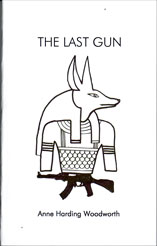 The Last Gun by Anne Harding Woodworth
The Last Gun by Anne Harding Woodworth
Červená Barva Press, 2016-
Anne Harding Woodworth is the author of five books of poetry, the most recent being Unattached Male (Poetry Salzburg, 2014). The Last Gun is her fourth chapbook after Up From the Root Cellar and Herding, both from Červená Barva Press. A selection from The Last Gun won the 2015-2016 COG Poetry Award out of Cogswell College, San Jose, CA, judged by poet A. Van Jordan, who wrote: "You'll find that The Last Gun is 'a gathering place for... admirers, rememberers, the once-armed.'" Harding Woodworth lives in Washington, D.C., where she is a member of the Poetry Board at the Folger Shakespeare Library.
"Just when you thought you knew all the arguments in America's gun debate, here comes Anne Harding Woodworth's powerful chapbook, The Last Gun. In these haunting poems, the "last" gun clears its throat and speaks. He speaks his fears and hopes in a voice as unexpected as it is unsettling. We almost feel sorry for him as we follow his arrest, imprisonment, and more. These poems aim straight at the rhetoric. They trigger some laughs but mostly they lament a country in which we hear too much from guns. Guns usually get what they want. But here, in this smart, insightful collection, Anne Harding Woodworth only appears to show the gun's humanity. Actually, she shows us our own."
-Joseph Ross, Author of Ache, Gospel of Dust, and Meeting Bone ManAn excerpt from The Last Gun was the winner of the 2015-2016 COG Poetry Awards (Cogswell Polytechnical College, San Jose, CA), judged by poet A. Van Jordan, who wrote:
The Last Gun opens with smoke and closes with a bang. These poems toggle between the spirits of the living and the spirits the living carry into death "to ask questions, to contemplate/ a state of being that is no more." These poems care about what we carry with us on our journeys and how others hold us in memory. As a reader, you'll find that The Last Gun is "a gathering place for... admirers, rememberers, the once-armed," and this poet has prepared us both "for the journey... where it will be judged," and for the "deeds on earth."
$7.00 | 37 Pages | In Stock
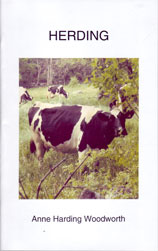 Herding by Anne Harding Woodworth
Herding by Anne Harding Woodworth
Červená Barva Press, 2014-
Anne Harding Woodworth is the author of five books of poetry and three chapbooks. She lived on a farm in New York State during much of her childhood, where her fondness for cows began. It has stayed with her in spite of living in New York City; Detroit; Athens, Greece; and Frankfurt, Germany. She now divides her time between a cabin in the mountains of Western North Carolina and a home in Washington, D.C., where she is a member of the Poetry Board at the Folger Shakespeare Library. (www.annehardingwoodworth.com)
In Herding, cows rush in where angels fear to tread, as Anne Harding Woodworth finds the human in the cow and the cow in the human. Cows serve as figurative and literal witness here, be they standing by during a speaker's contemplative walk through a country morning or dressing up as a contest winner's best man, "forced to masquerade / as a bull masquerading as a best man // wearing a tailor-made bovine tuxedo." Woodworth's poems are funny and even ridiculous at times, but don't be fooled into thinking this is light verse. Here, we find the essential: our place on and of the earth, and in the immediate and more general human relationships that make up our personal herd.
$7.00 | 32 Pages | In Stock
—Ruth Foley, Managing Editor of Cider Press Review and author of Dear Turquoise
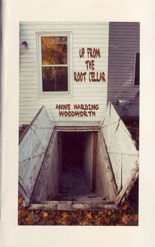 Up From The Root Cellar by Anne Harding Woodworth
Up From The Root Cellar by Anne Harding Woodworth
Červená Barva Press, 2008-
If the root cellar connotes dark and damp, it also promises nourishment-and this book serves up a startling buffet. Whether imagining herself into a grave, a slaughterhouse, or a rose that holds a family memory, Anne Harding Woodworth is attentive to how "secrets rise to the surface." Her range of subject matter is startling-from famine to termites to dowsing for bodies-and she deftly works a root vegetable into nearly every poem, including one about the invention of the potato chip and another that turns the peeling of an Idaho into a sexy striptease. Up from the Root Cellar is rich with music, and brings a satisfying harvest of buried and strewn things to light.
Ellen Doré Watson, author of This SharpeningIn Up from the Root Cellar, Anne Harding Woodworth delights us with a quick and unblinking look to the cold, soupy, death-in-life world that roots our body's generation, and our ladders of art. Her poems feel through near-frozen "rhizomes / tightly wadded leaves," and wan cyclopean russet potatoes, "wide-eyed, looking for a way out," in order redefine the human form, the ways that the body seeks its "light-time" even as it must bow to physical limits, "dry-weighted, wet-weighted, scoped on dials, squeezed into ratio." Woodworth's instincts for the contrarian, and messy-microbial sources for human stories put her alongside the garden-shed bio-poetries of Roethke and Marianne Moore. Yet her sudden turns and wacky humor find their own force and presence.
David Gewanter, author of The Sleep of ReasonOne of the many pleasures of poetry is that of coming into the company of an interesting mind. In Up from the Root Cellar, Anne Harding Woodworth uses her central metaphor to plumb the mysteries of preservation and renewal in ways that are fresh and surprising. Her tender, gently subversive poems, with their rich wordplay and mischievous imagery, succeed in bringing up from the darkness of the root cellar insights that delight and enlighten.
Jean Nordhaus, author of InnocenceBoston Area Small Press and Poetry Scene review:
$7.00 | 45 Pages | In Stock: 25
http://dougholder.blogspot.com/search?q=anne+harding+woodworth
Grzegorz Wroblewski
New Release: I REALLY LIKE LOVERS OF POETRY by Grzegorz Wróblewski
 I REALLY LIKE LOVERS OF POETRY by Grzegorz Wróblewski
I REALLY LIKE LOVERS OF POETRY by Grzegorz Wróblewski
Translated from the Polish by Grzegorz Wróblewski & Marcus Silcock Slease
Červená Barva Press, 2024-
Grzegorz Wróblewski was born in 1962 in Gdansk and grew up in Warsaw. Since 1985 he has been living in Copenhagen. English translations of his work are available in Our Flying Objects (trans. Joel Leonard Katz, Rod Mengham, Malcolm Sinclair, Adam Zdrodowski, Equipage, 2007), A Marzipan Factory (trans. Adam Zdrodowski, Otoliths, 2010), Kopenhaga (trans. Piotr Gwiazda, Zephyr Press, 2013), Let's Go Back to the Mainland (trans. Agnieszka Pokojska, Červená Barva Press, 2014), Zero Visibility (trans. Piotr Gwiazda, Phoneme Media, 2017), Dear Beloved Humans (trans. Piotr Gwiazda, Lavender/Dialogos Books, 2023) Asemic writing book Shanty Town (Post-Asemic Press, 2022).
Marcus Silcock Slease is a (mostly) surreal-absurd writer from Portadown, N. Ireland. He is the author of Puppy (Beir Bua Press), Never Mind the Beasts (Dostoyevsky Wannabe), The Green Monk (Boiler House Press), and Play Yr Kardz Right (Dostoyevsky Wannabe), among others. His poetry has been translated into Polish and Danish and has appeared or is forthcoming in various magazines and anthologies, including: Tin House, Poetry, The Lincoln Review, Bath Magg, New World Writing, Tupelo Quarterly, and in the Best British Poetry series. He lives in Sitges, Spain. Find out more at: Never Mind the Beasts (www.nevermindthebeasts.com)
"I REALLY LIKE LOVERS OF POETRY" is the latest book of poetry by Grzegorz Wróblewski. The English versions of the poems are the author's work in collaboration with Marcus Silcock Slease. The author was born in Poland in 1962 and has lived in Copenhagen, Denmark, since 1985. Grzegorz Wróblewski is translated into many languages. The current book raises existential issues concerning the paradoxes of human functioning, loneliness and human isolation. The poetic works in this book are often minimalistic, devoid of the metaphorical structure typical of European lyric poetry. They may sometimes be associated with Zen poetry. The poems from the volume "I REALLY LIKE LOVERS OF POETRY" are also a criticism of the modern world full of consumerism. They try to draw the reader's attention to issues that are lost in a world full of ruthless materialism.
Polish writer and visual artist Grzegorz Wróblewski has written I Really Like Lovers of Poetry directly in English with assistance of his friend and fellow writer Marcus Slease. A translation, a collaboration, certainly an experiment, it is above all a collection of mordant parables about humans — and occasionally nonhumans too. A moralist at heart, like Bertolt Brecht, Wróblewski demystifies and clarifies: "Everyone is looking for the truth. / The only truth is the rumbling / of our stomachs."
—Piotr Gwiazda, translator of Dear Beloved Humans: Selected Poems by Grzegorz WróblewskiIn his latest book of poems, Grzegorz Wróblewski delivers what readers have always loved him for: his take on not just the personal, but the condition of human beings and all creatures (I would like to wake up someday/among people who respect both/wolves and pigs) in the often mysterious planet we live on. Sometimes the take is acerbic, sometimes the take has a dark absurdity to it, sometimes the take is full of genuine wit, sometimes the take has a forbearance of humanity that even surprises the poet, but at all times these poems ring true in their brilliance, even if a bit of hurt must be endured for posing those truths: Listen to the silence of heaven./You won’t understand any of it. But at least you’ll be closer/to the silent clouds./Closer to where you got here/by a mistake. But there's no mistaking Wróblewski's poetic gifts and the lovely rigor of his challenging mind.
—Tim Suermondt, author of A Doughnut And The Great Beauty Of The WorldCover art: "50 x 50 The Boys from Amager II" by Grzegorz Wróblewski
$16.00 | ISBN: 978-1-950063-93-2 | 38 Pages
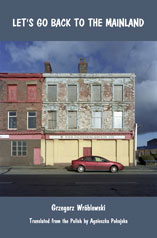 Let's Go Back To The Mainland
Let's Go Back To The Mainland
by Grzegorz Wroblewski
Translated from the Polish by Agnieszka Pokojska
Červená Barva Press, 2014-
Grzegorz Wroblewski, born in 1962 in Gdansk and raised in Warsaw, has been living in Copenhagen since 1985. He has published ten volumes of poetry and three collections of short prose pieces in Poland; three books of poetry, a book of poetic prose and an experimental novel (translations) in Denmark; and a book of selected poems in Bosnia-Herzegovina, as well as a selection of plays. His work has been translated into fifteen languages. His recent book of prose poems, Kopenhaga, was published by Zephyr Press, 2013.
Between classical lyricism and central European surrealism, between the punk aesthetic of Mark E Smith and the existentialism of Camus, between the miniatures of Joseph Cornell and the stalker of Tarkovsky, between painting, plays, poetry, performance art, and the memoir, between Poland and Denmark and the milky way, Grzegorz Wroblewski is on the mainland. His work is the most distinct and diverse coming out out of the so-called "bruLion generation" always moving into the major leagues of this universe and perhaps others. If we don't become extinct as a species in the near future, Wroblewski will go down as one of our greatest writers, artists, and thinkers.
-Marcus Slease, author of Mu (so) Dream (window)Cover photo: Wojciech Wilczyk
Review by Ann Wehrman: http://www.thepedestalmagazine.com/gallery.php?item=23672
$17.00 | ISBN: 978-0-9910091-7-6 | 96 pages | In Stock
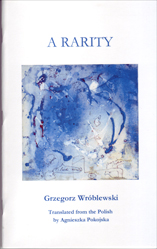 A Rarity by Grzegorz Wroblewski
A Rarity by Grzegorz Wroblewski
Translated from the Polish by Agnieszka Pokojska
Červená Barva Press, 2009-
Grzegorz Wroblewski, born in 1962 in Gdansk and raised in Warsaw, has been living in Copenhagen since 1985. He has published eight volumes of poetry and two collections of short prose pieces in Poland; three books of poetry, a book of poetic prose and an experimental novel (translations) in Denmark; and a book of selected poems in Bosnia-Herzegovina, as well as a selection of plays. His work has been translated into five languages. The English translations of his poems and/or plays have appeared in London Magazine, Poetry London, Magma Poetry, Parameter Magazine, Poetry Wales, The Delinquent, Chicago Review, 3rd bed, Eclectica, Mississippi Review, Absinthe: New European Writing, Common Knowledge, Word Riot, Practice: New Writing + Art, The Mercurian – A Theatrical Translation Review, Lyric, Exquisite Corpse, Jacket Magazine, West Wind Review and in the following anthologies: Altered State: The New Polish Poetry (Arc Publications, Todmorden, UK 2003), Carnivorous Boy Carnivorous Bird (Zephyr Press, Brookline, USA 2004), A Generation Defining Itself – In Our Own Words (MW Enterprises, USA 2007). A volume of his selected poems Our Flying Objects (Equipage Press, Cambridge, UK) was published in 2007. His chapbooks to date are: These Extraordinary People (erbacce-press, Liverpool, UK 2008) and Mercury Project (Toad Press, Claremont, USA 2008).
Agnieszka Pokojska is a freelance translator and editor, tutor in literary translation at the Jagiellonian University in Krakow, and author of a number of articles on translation. Her translations into Polish include poems by Seamus Heaney, Robert Pinsky and Derek Walcott. Her translations of Grzegorz Wróblewski's poetry appeared in the anthology Carnivorous Boy Carnivorous Bird, in Lyric Poetry Review, West Wind Review, Eclectica Magazine, The Delinquent and Poetry Wales.
$7.00 | 32 Pages | In Stock
Home | Červená Barva Press Books | Poetry Chapbooks | Poetry Books | Anthologies | Fiction | Flash Fiction | Literary Journals | Non-fiction | Plays | Memoirs | Used Books | Audio CD's
